
As an environmental enthusiast, I’ve always been fascinated by the ingenious ways we can harness science and technology to tackle the pressing challenges we face. One area that has particularly piqued my interest is the advancement of wastewater treatment through the use of electrochemical processes. It’s a captivating realm where cutting-edge research is unlocking remarkable possibilities for a more sustainable future.
Let me take you on a journey, dear reader, as I delve into the intriguing world of electrochemical wastewater treatment. From the cutting-edge research that’s pushing the boundaries to the real-world applications that are making a tangible difference, prepare to be enlightened and inspired.
The Limitations of Conventional Wastewater Treatment
Traditional wastewater treatment methods have served us well for decades, but as the world evolves, we’re facing new challenges that demand innovative solutions. Conventional techniques, such as biological and physicochemical processes, can be effective in removing certain contaminants, but they often struggle with more persistent and recalcitrant pollutants.
Imagine a scenario where you’ve got a wastewater stream laced with stubborn pharmaceuticals, pesticides, or even heavy metals. These pesky compounds can slip through the cracks of traditional treatment methods, leaving behind a trail of environmental and public health concerns. And as our industrial and agricultural activities continue to grow in complexity, the need for more robust and versatile treatment solutions becomes increasingly pressing.
The Rise of Electrochemical Wastewater Treatment
Enter the world of electrochemical wastewater treatment – a game-changing approach that’s capturing the attention of researchers and industry leaders alike. At its core, this technology harnesses the power of electrochemical reactions to tackle a wide range of pollutants, from organic compounds to heavy metals and beyond.
Imagine a wastewater treatment system where electrodes are used to generate reactive species, such as hydroxyl radicals and hydrogen peroxide, which can then oxidize and reduce the target contaminants. It’s a bit like a high-tech, aqueous version of a chemistry lab, where we can precisely control the reactions to achieve the desired outcomes.
But the beauty of electrochemical processes lies not just in their versatility, but also in their efficiency and cost-effectiveness. By carefully tuning the system parameters, we can optimize the treatment process to minimize energy consumption and maximize the removal of pollutants. And the best part? This technology can be seamlessly integrated into existing treatment facilities, making it a practical and scalable solution for a wide range of applications.
Unlocking the Potential of Electrochemical Wastewater Treatment
As I delve deeper into the research, I’m consistently amazed by the innovative approaches being explored by scientists and engineers. Take, for instance, the use of boron-doped diamond electrodes, which have shown remarkable performance in the removal of organic compounds and heavy metals. These specialized electrodes can generate a high concentration of hydroxyl radicals, which are incredibly effective at oxidizing even the most stubborn pollutants.
And the applications don’t stop there. Researchers are also exploring the integration of electrochemical processes with other treatment methods, such as membrane filtration and adsorption, to create hybrid systems that can tackle an even broader range of contaminants. By combining the strengths of these technologies, we’re unlocking new frontiers in wastewater treatment.
But the excitement doesn’t end there. Alpha Wastewater has been at the forefront of implementing these cutting-edge electrochemical technologies in real-world settings. Through their innovative solutions, they’ve been able to effectively remove a wide range of pollutants, from pharmaceuticals to per- and polyfluoroalkyl substances (PFAS), while also reducing energy consumption and operating costs.
The Future of Electrochemical Wastewater Treatment
As I look towards the future, I can’t help but feel a sense of excitement and optimism. The continuous advancements in electrochemical wastewater treatment hold the promise of a cleaner, more sustainable tomorrow. Researchers are exploring the use of renewable energy sources, such as solar and wind power, to power these systems, further enhancing their environmental friendliness.
And the potential applications go far beyond just wastewater treatment. Electrochemical processes are also being explored for the recovery and reuse of valuable resources, such as metals and nutrients, from wastewater streams. Imagine a future where we can transform our waste into a valuable resource, closing the loop and creating a more circular economy.
Of course, as with any emerging technology, there are still challenges to overcome. Researchers are working to optimize the system efficiency, reduce operating costs, and address scaling and fouling issues. But with the ongoing commitment and innovative spirit of the scientific community, I’m confident that these hurdles will be overcome, paving the way for a more sustainable and resilient wastewater treatment landscape.
As I wrap up my exploration of this fascinating field, I can’t help but feel inspired by the incredible potential of electrochemical wastewater treatment. From the cutting-edge research to the real-world applications, it’s a testament to the power of human ingenuity and our ability to tackle even the most daunting environmental challenges. So, let’s raise a metaphorical glass to the scientists, engineers, and visionaries who are pushing the boundaries of what’s possible, and let’s look forward to a future where clean water is not just a dream, but a tangible reality.